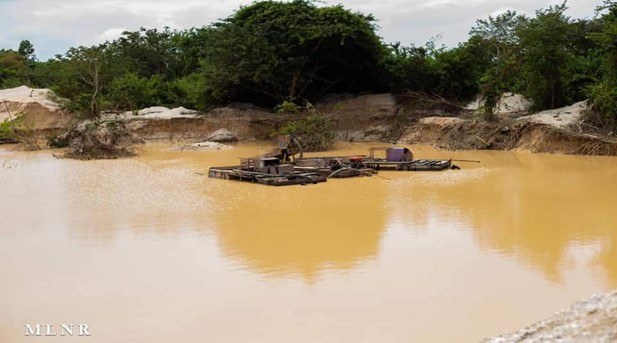In a unified stance, the coalition of Civil Society Organisations (CSOs) in Agriculture, Aquaculture, and Fisheries has called on President Ado Dankwa Akufo Addo, the executive branch, and Parliament to urgently address illegal mining.
Known as galamsey, illegal mining is causing irreversible damage to the country’s agricultural and aquatic ecosystems.
The coalition, composed of key industry bodies and stakeholders, emphasised the dire need for decisive action to protect the nation’s natural resources, food security, and public health.
The coalition highlighted several alarming consequences of galamsey, presenting a comprehensive summary of the devastating effects on Ghana’s environment and economy:
Depletion of Forest Reserves and Freshwater Bodies: According to the Food and Agriculture Organization (FAO), 78% of Ghana’s freshwater bodies have been severely impacted by galamsey, leading to the destruction of vast portions of the country’s forest reserves.
Loss of Aquatic Life and Biodiversity: The Ghana Standards Authority (GSA) reported that the nation’s aquatic life and biodiversity are in steep decline. This has resulted in significant economic challenges, including a staggering US$1.2 billion annual fish import bill.
Threats to Food Security and National Stability: The Ministry of Trade and Industry (MoTI) emphasised that galamsey poses severe risks to food security, job creation, and health, potentially threatening the nation’s stability.
Pollution and Forest Loss: The Environmental Protection Agency (EPA) revealed alarming levels of pollution in water bodies, alongside substantial forest cover loss due to illegal mining activities.
Health Hazards: The Ghana Health Service (GHS) linked galamsey-related pollution to serious health risks, including cancer, respiratory diseases, and birth defects caused by exposure to hazardous chemicals used in mining operations.
Economic Losses: According to the Ghana Statistical Service (GSS), the economic toll of galamsey is estimated at $2.3 billion annually, with over 1 million people directly involved in these illegal mining activities.
Urgent call to action
In response to these challenges, the coalition made several urgent demands calling for an immediate halt to all illegal mining operations across the country.
They also requested the resignation or dismissal of the Minister for Mines and Natural Resources and his deputies, holding them accountable for failing to curb the activities of illegal miners.
Restoring degraded lands and prosecuting those responsible for environmental destruction were also high on the agenda. The coalition emphasised the need for a comprehensive approach to rehabilitate affected areas and prevent further damage.
They called for the establishment of sustainable mining practices that would support local communities and industries, ensuring that future mining activities are carried out responsibly.
Additionally, the coalition urged the government to form a National Anti-Galamsey Steering Committee made up of respected, non-partisan citizens and key stakeholders. This committee would be tasked with leading the fight against illegal mining and overseeing efforts to restore the environment.
They also recommended the deployment of military and police personnel to galamsey hotspots to enforce the law and protect the country’s natural resources.
The coalition stressed the importance of conducting environmental assessments to gauge the full extent of the damage caused by illegal mining. They advocated for the development of a National Mining Policy and the creation of a Galamsey Rehabilitation Fund to provide alternative livelihoods for those affected by the crackdown on illegal mining.
They called for the promotion of agroforestry and reforestation initiatives to restore Ghana’s forests and enhance biodiversity.
They also urged the Minister of Food and Agriculture to take a strong stand against galamsey, work closely with the Ministry of Environment, and support farmers whose lands have been impacted by illegal mining.










